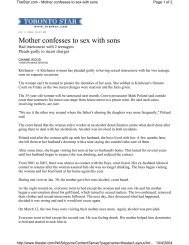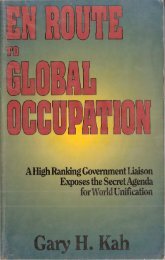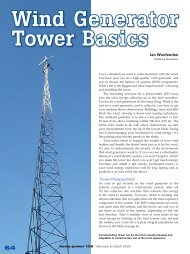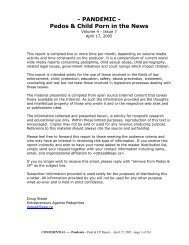G. Edward Griffin - The Fearful Master - PDF Archive
G. Edward Griffin - The Fearful Master - PDF Archive
G. Edward Griffin - The Fearful Master - PDF Archive
You also want an ePaper? Increase the reach of your titles
YUMPU automatically turns print PDFs into web optimized ePapers that Google loves.
failure to vote was automatically considered a veto. But, due to the "flexibility" of the<br />
Charter and "dynamic usage," the practice now is that failure to vote does not constitute a<br />
veto. At the time of the Korean invasion, this concept was right in the middle of being<br />
"evolved' and it was no time to put it to the test. Consequently, at the primary insistence of<br />
the U.S. a "unified command" was established under theoretical American control and a<br />
"uniting for peace" resolution was introduced before the General Assembly, where it<br />
passed with little difficulty. <strong>The</strong> resolution established the following profound changes in<br />
UN procedure:<br />
1. If, due to a veto, the Security Council fails to act in a case of military<br />
crisis, the General Assembly can hold an emergency session to take up<br />
the matter.<br />
2. In such a case, the General Assembly can call on member nations to<br />
make available their armed forces for whatever military action the<br />
General Assembly may recommend. 18<br />
Here, then, is one more thread. Loss of the veto is no small matter--as even Trygve Lie<br />
was forced to admit: "<strong>The</strong> Assembly by adopting the Acheson [Uniting for Peace] Plan,<br />
engineered a profound shift of emergency power from the veto-ridden Security Council to<br />
the veto-less General Assembly--a shift the full potentialities of which have still to be<br />
realized." 19 It means that at some future date Uncle Sam will awaken from his long<br />
slumber only to find that be is completely at the mercy of a majority vote within a mob of<br />
angry Lilliputians screaming for his head; and that the harmless world forum that he<br />
thought he created has transformed itself into an all-powerful world government fully<br />
capable of performing the execution.<br />
In an apparently calm acceptance of this grim fate for our country, President Lyndon<br />
Johnson, nonchalantly stated it this way: "In a world of 113 nations, 50 of which have had<br />
new governments in the past three years, the United States must be prepared for<br />
change." 20<br />
NOTES<br />
1. From a letter to Joseph C. Cabell, February 2, 1816, <strong>The</strong> Writings of Thomas Jefferson<br />
(Washington, D.C., Thomas Jefferson Memorial Association, 1905), vol. 14, p. 421.<br />
2. American Historical Documents, p. 152.<br />
3. "<strong>The</strong> Bricker Amendment," speech by Robert H. Montgomery (Boston, June 13, 1955).<br />
4. Reparations for Injuries Suffered in the Service of the United Nations, International<br />
Court of Justice opinion. As quoted by Abraham Feller, general legal counsel for the<br />
United Nations, in his book United Nations and World Community (Boston, Little, Brown &<br />
Company, 1952), p. 41.<br />
5. As quoted by J. B. Matthews, American Opinion (May 1958), pp. 8-9.<br />
6. As quoted by Ewell, p. 28.<br />
7. Chicago Tribune (October 29, 1956), pp. 1, 20.


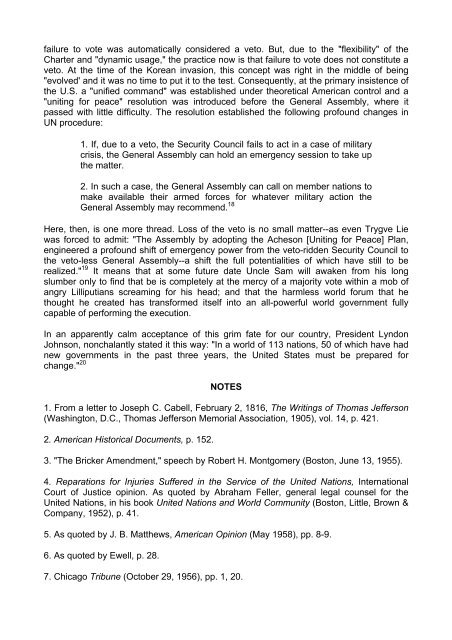
![Robert T McQuaid [rtmq@stn.net] Sent: Friday, October 29, 2004 12 ...](https://img.yumpu.com/51070071/1/190x245/robert-t-mcquaid-rtmqstnnet-sent-friday-october-29-2004-12-.jpg?quality=85)



